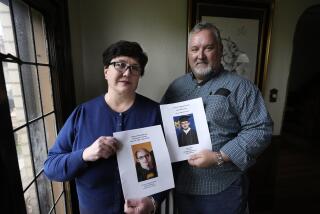Law Against Assisted Suicide Voided by Judge in Michigan
- Share via
CHICAGO — A Michigan “anti-suicide” law designed to thwart Dr. Jack Kevorkian’s aid to patients seeking to kill themselves was struck down Thursday by a Detroit judge, jeopardizing a probe into the retired pathologist’s role in a recent suicide.
Wayne County Circuit Judge Cynthia Stephens ruled that a new state law making it a felony to assist in a suicide is unconstitutional because of procedural errors made in February during its passage by the Michigan Legislature.
Expecting an appeal to the judge’s ruling, Kevorkian’s attorney, Geoffrey Feiger, declined to say if his client plans to continue aiding in suicides. But the lawyer said he could not guarantee that Kevorkian would hold off from assisting in suicides while the law is debated in the courts.
The immediate effect of the ruling was to cast into doubt a Wayne County police investigation of Kevorkian’s role in the suicide last week of Ron Mansur, 54, a Detroit real estate agent reportedly suffering from lung and bone cancer.
“Anybody who’s thinking about charging Dr. Kevorkian can forget about it,” Feiger said.
Mansur killed himself Sunday at his office by inhaling carbon monoxide through a mask. Kevorkian, who has assisted in 15 other deaths since 1990, was arrested, then released several hours later, after Feiger acknowledged that the retired doctor had been present during the suicide. Although his actions are under investigation by the Wayne County prosecutor’s office, Kevorkian has not been charged in the case.
Before Mansur’s death, Kevorkian would aid in suicides in front of patients’ relatives and other witnesses. He would supply a carbon-monoxide or intravenous-drug apparatus to the patients, who then killed themselves. But in Mansur’s case, Kevorkian admitted only that he had been present while the patient died. No other witnesses were with him.
Howard Simon, executive director of the Michigan branch of the American Civil Liberties Union, said the ruling will allow competent adults “to hasten their own deaths from terminal illness--whether that help comes from Dr. Kevorkian or from their personal physicians.”
The ACLU challenged the state law on behalf of two terminally ill cancer patients and seven Michigan doctors, claiming that the statute violated the constitutional rights of terminally ill patients. Kevorkian was not party to the suit.
In her 18-page opinion, Stephens wrote that the law violates state procedure because the Legislature illegally inserted specific anti-suicide language into a broader bill intended to establish a commission studying death-and-dying issues.
Stephens also ruled that the Michigan Legislature acted illegally when it passed the new law by altering the statute in the final stages of legislative passage. Stephens said that legislators rushed the law into effect and did not allow ample time for the public to debate the issue.
More to Read
Sign up for Essential California
The most important California stories and recommendations in your inbox every morning.
You may occasionally receive promotional content from the Los Angeles Times.













